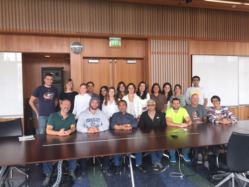CEND Investigator and Grad Students Publish Paper on Antimicrobial Resistance
CEND Investigator Dr. Lee Riley and lab members Julia Rubin, Kaitlyn Mussio, Yaqi Xu, and Joy Suh recently published their paper Prevalence of Antimicrobial Resistance Genes and Integrons in Commensal Gram-Negative Bacteria in a Community College in the journal Microbial Drug Resistance.
Abstract
Although the human intestinal microbiome has been shown to harbor antimicrobial drug resistance genes (ARGs), the prevalence of such genes in a healthy population and their impact on extraintestinal infections that occur in that community are not well established. This study sought to identify ARG prevalence and their mobile elements in the intestines of a healthy community population at a California University, and compared these genes to those previously identified among uropathogenic Escherichia coli isolated from patients with urinary tract infection from the same community. We isolated Gram-negative bacteria (GNB) from fecal samples of healthy volunteers and screened them by polymerase chain reaction for class 1 integron cassette sequences and ARGs encoding resistance against ampicillin, trimethoprim-sulfamethoxazole, gentamicin, and colistin. We found antimicrobial-resistant GNB from 83 (81%) of 102 nonredundant rectal swab samples. Seventy-four (72%) of these samples contained β-lactamase genes (blaTEM, blaSHV, blaCTX-M, blaOXA, and blaOXY), dihydrofolate reductase (DHFR) genes (dhfr-A17, dhfr-A12, dhfr-A7, dhfr-A5, dhfr-A21, dhfr-A1, dhfr-A13, and dhfr-7), and aminoglycoside resistance genes (aadA5, aadA2, aadA1, and aadB). Integron sequences were found in 37 (36%) fecal samples. These genes were found in 11 different GNB species. The high prevalence of clinically common ARGs and integrons harbored by GNB in the intestine of a healthy population suggest that human intestines may serve as a major reservoir of these mobile ARGs that appear in E. coli strains causing extraintestinal infections in the same community.

